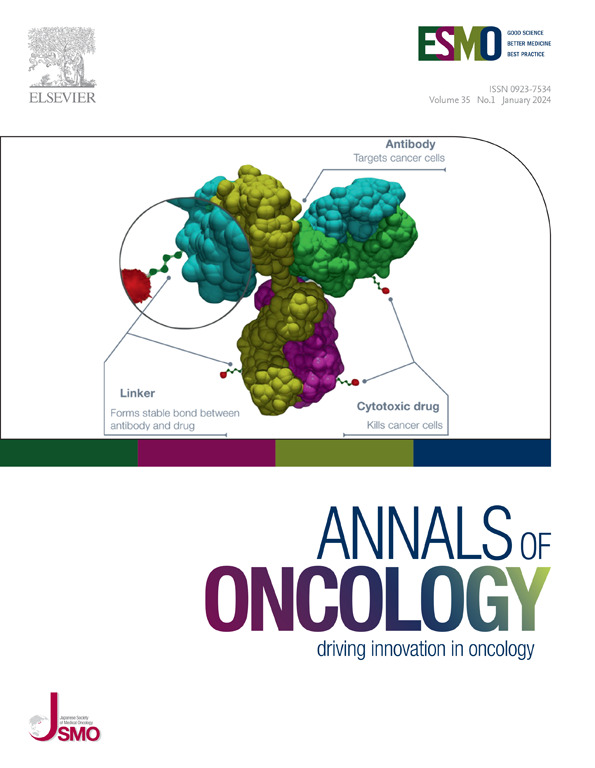新佐剂shrr - a1811加或不加吡罗替尼治疗局部晚期或早期her2阳性乳腺癌的疗效和安全性:一项随机、开放标签、2期试验
IF 56.7
1区 医学
Q1 ONCOLOGY
引用次数: 0
摘要
背景:her2阳性乳腺癌的标准新辅助方案包括曲妥珠单抗和帕妥珠单抗联合化疗,第三代her2定向抗体-药物偶联(ADC)的疗效和安全性仍有待阐明。患者和方法:这项开放标签、随机、2期研究纳入了年龄在18岁或以上的II-III期her2阳性乳腺癌患者。患者被随机分配(1:1:1)接受新辅助治疗,分别为SHR-A1811单药治疗、SHR-A1811联合吡罗替尼治疗或nab-紫杉醇联合卡铂、曲妥珠单抗和帕妥珠单抗(ppcbhp)治疗24周。主要终点为病理完全缓解(pCR)。对接受至少一剂研究药物的患者的安全性进行了分析。结果:在2022年12月27日至2024年2月11日期间,265名患者被随机分配到新辅助治疗组、单药shl - a1811组(n=87)、shl - a1811联合吡罗替尼组(n=88)或PCbHP组(n=90)。基线特征平衡良好;约45%的患者为激素受体(HR)阳性,70%的患者为III期。单个hsh - a1811的pCR率为63.2% (HR+为50%,HR-为74.5%),hsh - a1811联合吡罗替尼的pCR率为62.5% (HR+为44.7%,HR-为76%),ppcbhp为64.4% (HR+为54.1%,HR-为71.7%),组间差异无统计学意义。3级或以上的治疗相关不良事件发生率分别为44.8%、71.6%和38.8%,分别为单一SHR-A1811和pyrotinib联合治疗组。1例患者在SHR-A1811组出现2级间质性肺病,9.1%的患者在SHR-A1811加吡罗替尼组出现3级腹泻,无治疗相关死亡发生。结论:这是第一个报告第三代her2导向ADC在her2阳性乳腺癌新辅助治疗中的有效性和安全性的研究。SHR-A1811表现出强大的活性,具有可容忍的安全性。(ClinicalTrials.gov NCT05582499)。本文章由计算机程序翻译,如有差异,请以英文原文为准。
Efficacy and safety of neoadjuvant SHR-A1811 with or without pyrotinib in women with locally advanced or early HER2-positive breast cancer: a randomized, open-label, phase II trial
Background
Standard neoadjuvant regimens for human epidermal growth factor receptor 2 (HER2)-positive breast cancer include trastuzumab and pertuzumab combined with chemotherapy, and the efficacy and safety of third-generation HER2-directed antibody–drug conjugate (ADC) remain to be elucidated.
Patients and methods
This open-label, randomized, phase II study enrolled patients aged ≥18 years with stage II-III HER2-positive breast cancer. Patients were randomly assigned (1 : 1 : 1) to receive neoadjuvant treatment either with SHR-A1811 monotherapy, SHR-A1811 with pyrotinib, or nab-paclitaxel combined with carboplatin, trastuzumab, and pertuzumab (PCbHP) for 24 weeks. The primary endpoint was pathological complete response (pCR). Safety was analysed in patients who received at least one dose of study medication.
Results
Between 27 December 2022 and 11 February 2024, 265 patients were randomly allocated to neoadjuvant, mono-SHR-A1811 (n = 87), SHR-A1811 plus pyrotinib (n = 88), or PCbHP (n = 90). The baseline characteristics were well balanced; ∼45% of the patients were hormone receptor (HR) positive, and 70% of the patients were stage III. The pCR rate was 63.2% for mono-SHR-A1811 (50% for HR positive and 74.5% for HR negative), 62.5% for SHR-A1811 plus pyrotinib (44.7% for HR positive and 76% for HR negative), and 64.4% for PCbHP (54.1% for HR positive and 71.7% for HR negative), with no significant difference between the groups. Grade ≥3 treatment-related adverse events occurred in 44.8% of patients with mono-SHR-A1811, 71.6% with SHR-A1811 plus pyrotinib, and 38.8% with PCbHP. One patient experienced grade 2 interstitial lung disease in SHR-A1811, 9.1% of patients experienced grade 3 diarrhoea in SHR-A1811 plus pyrotinib, and no treatment-related deaths occurred.
Conclusions
This is the first study to report the efficacy and safety of third-generation HER2-directed ADC in the neoadjuvant setting for HER2-positive breast cancer. SHR-A1811 showed robust activity, with a tolerable safety profile.
求助全文
通过发布文献求助,成功后即可免费获取论文全文。
去求助
来源期刊

Annals of Oncology
医学-肿瘤学
CiteScore
63.90
自引率
1.00%
发文量
3712
审稿时长
2-3 weeks
期刊介绍:
Annals of Oncology, the official journal of the European Society for Medical Oncology and the Japanese Society of Medical Oncology, offers rapid and efficient peer-reviewed publications on innovative cancer treatments and translational research in oncology and precision medicine.
The journal primarily focuses on areas such as systemic anticancer therapy, with a specific emphasis on molecular targeted agents and new immune therapies. We also welcome randomized trials, including negative results, as well as top-level guidelines. Additionally, we encourage submissions in emerging fields that are crucial to personalized medicine, such as molecular pathology, bioinformatics, modern statistics, and biotechnologies. Manuscripts related to radiotherapy, surgery, and pediatrics will be considered if they demonstrate a clear interaction with any of the aforementioned fields or if they present groundbreaking findings.
Our international editorial board comprises renowned experts who are leaders in their respective fields. Through Annals of Oncology, we strive to provide the most effective communication on the dynamic and ever-evolving global oncology landscape.
 求助内容:
求助内容: 应助结果提醒方式:
应助结果提醒方式:


